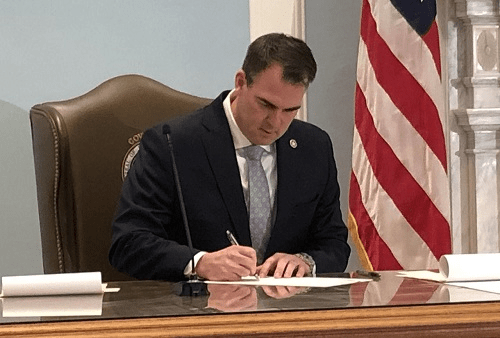
OKLAHOMA CITY — Oklahoma’s Republican-controlled Legislature resoundingly overrode six of fellow Republican Gov. Kevin Stitt’s vetoes on Friday but left standing his rejection of Stitt’s own Medicaid funding bill.
All told, the Legislature has voted to override 10 of Stitt’s 19 vetoes this session, the most overrides in recent history. House Speaker Charles McCall, R-Atoka, suggested even more vetoes could have been overridden but a decision was made to “select bills important to the state of Oklahoma.”
Some might think that would include SB 1046, which would have funded Stitt’s SoonerCare 2.0, but McCall said the Legislature did its job by delivering the requested legislation to the governor.
Overridden Friday were Senate Bill 1002 and House Bill 4018, which are related to rural broadband access; HB 2749 and HB 2750, which provide money to fully meet long-standing obligations to match private donations to the state’s public colleges and universities and then effectively ends the matching program; HB 4049, which gives some protection to tag agencies; and HB 3819, which prohibits state agencies from restricting access to contracts and agreements or private individuals and employers.
Friday’s overrides were accomplished with ease and no real drama, although House Democrats used the occasion to tee up some of their Republican colleagues to vent frustration with the administration.
“Whoever wrote that veto message clearly never even read this bill,” Majority Leader Jon Echols, R-Oklahoma City, said in reference to a question about HB 3819.
Echols called the veto “shocking” and said the reasons given for rejection were “tangentially related to this bill at best.”
Lawmakers have grumbled this spring that Stitt and his staff have been disconnected from the legislative process, perhaps in part because of the administration’s focus on the COVID-19 pandemic and legislators’ six-week absence from the Capitol.
Rep. Logan Phillips, R-Mounds, said Friday he and the Legislature in general have been shut out of talks supposedly aimed at improving rural broadband access, and Rep. Kyle Hilbert, R-Depew, said HB 2749 does exactly the opposite of what the veto message implied.
Hilbert noted HB 2749 and HB 2750 would provide matching funds for donations including large ones from the late Boone Pickens, whose birthday was Friday.
This prompted Rep. Monroe Nichols, D-Tulsa, to quip that Stitt “probably decided to veto (HB 2749) at the Boone Pickens table” — a conference table formerly owned by Pickens now in the governor’s Capitol office suite.
Lawmakers did not take up Senate Bill 1046, which would have created a major revenue stream for the funding of Stitt’s proposed SoonerCare 2.0, a form of expanded Medicaid expected to take effect July 1.
SB 1046 would have raised to the maximum 4% the Supplemental Hospital Payment Program fee, better known as SHOPP. The fee is paid by hospitals to create a matching fund for federal Medicaid dollars.
Some hospitals objected to SB 1046 because it did not explicitly rule out a managed care system for Medicaid, and because not all hospitals pay into the SHOPP fund.
Stitt’s veto means SoonerCare 2.0 likely cannot be implemented even if the state’s application to the Center for Medicare and Medicaid Services is approved.
Friday’s actions likely end the Legislature’s activities for this session but it left open the possibility of reconvening before the statutory deadline for final adjournment next Friday.
Because of the COVID-19 pandemic the Legislature has met just 37 days this session, which is thought to be a record low. It recessed last Friday with the understanding it would not return except for veto override votes.
“All sessions are unique for a variety of reasons, but no one could have expected the events that unfolded during the 2020 session,” said President Pro Tem Greg Treat.
“Given all the circumstances, this was a successful legislative session and one that myself and senators can be proud of for what we achieved to move Oklahoma forward,” Treat said.
Laws

House Bill 2777

Senate Bill 1081

Senate Bill 1728

House Bill 3967

Senate Bill 1928

Senate Bill 1423

House Bill 3400

Senate Bill 1385

House Bill 3251

House Bill 4161

House Bill 2905

Senate Bills 1877 and 285

Senate Bill 1424

Twitter: @rkrehbiel

Barbara Hoberock
Capitol Bureau Writer
Barbara has covered the statehouse since 1994. She covers politics, appellate courts and state agencies. She has worked for the Tulsa World since 1990. Phone: 405-528-2465
